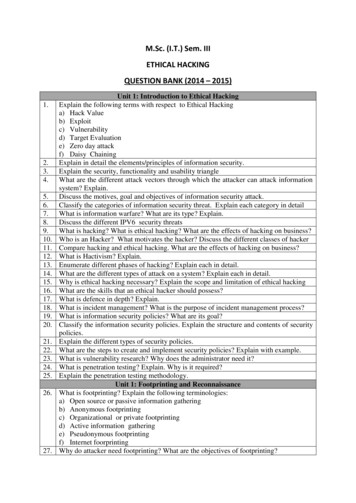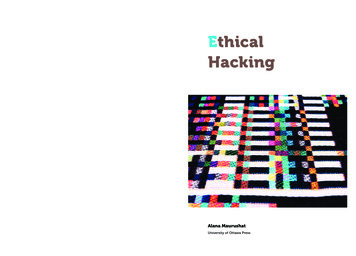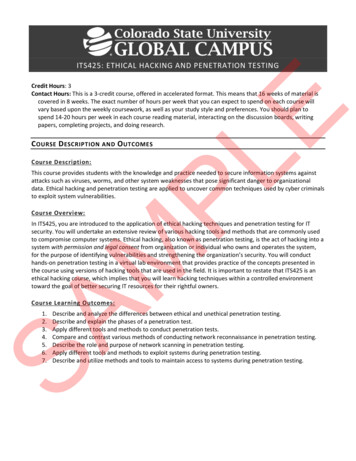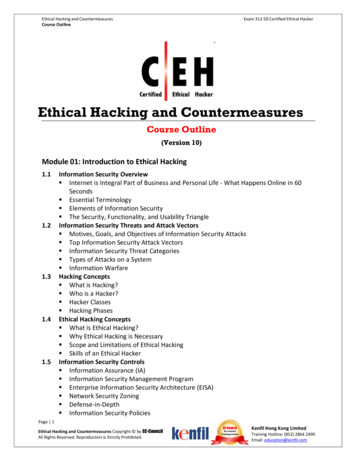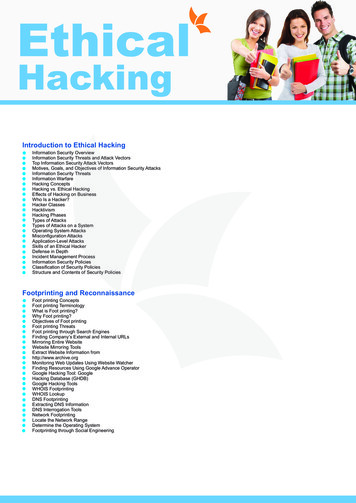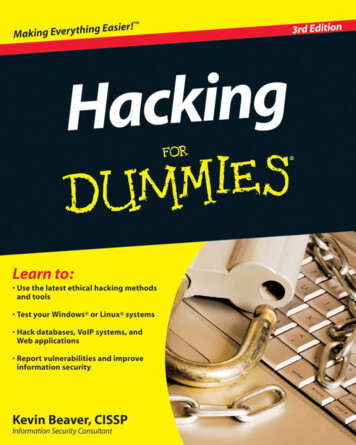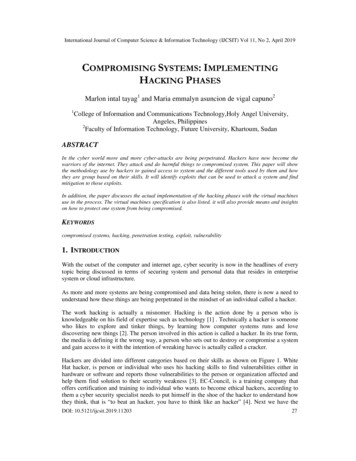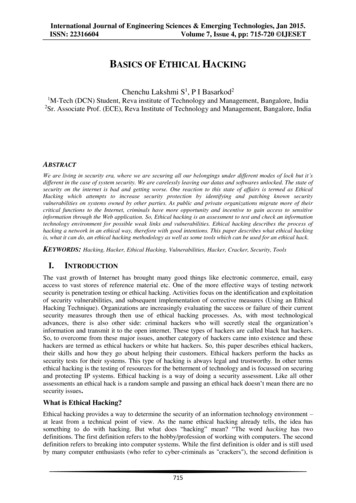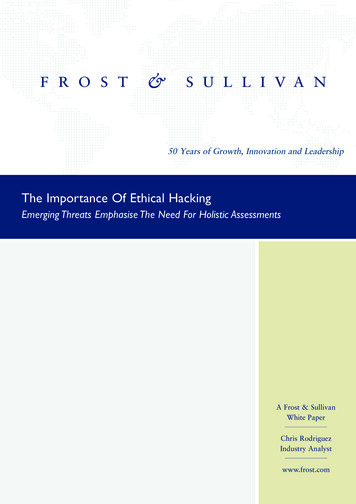
Transcription
50 Years of Growth, Innovation and LeadershipThe Importance Of Ethical HackingEmerging Threats Emphasise The Need For Holistic AssessmentsA Frost & SullivanWhite PaperChris RodriguezIndustry Analystwww.frost.com
Frost & Sullivan1. EXECUTIVE SUMMARY .32. THE COMPLEX THREAT LANDSCAPE .33. BENEFITS FROM INDEPENDENT ETHICAL HACKING ASSESSMENTS .5Complex Enterprise Networks Require Security Expertise .5Ethical Hacking Services Provide Objective Analysis and Validation .6Security as a Business Enabler.64. ETHICAL HACKING’S ROLE IN AN ENTERPRISE SECURITY ARCHITECTURE 7The Missing Piece in the Security Puzzle .7What Does Ethical Hacking Involve? .95. BUSINESS CHALLENGES AND RISK MITIGATION.10Relatively High Business Costs and Project Size .11Impact on Operations .11Fear of Consequences from a Negative Assessment .12Security and Privacy Concerns .12Project and Business Risk .136. TOP TECHNICAL CONCERNS AND SOLUTIONS .13Stability and Reliability of Critical IT Systems.13Quality Assessment Tools .14Custom Tool Requirements .15Assessment Accuracy .15Report Technicality.167. VENDOR SPOTLIGHT: HIGH-TECH BRIDGE .16Expert Ethical Hacking .16Breadth of Security Consulting Services .17In-depth, Actionable Reporting .17Industry Participation, Research, and Development .18Company Maturity and Reliability .198. CUSTOMER CASE STUDY AND KEY LESSONS .20Modern Information Security Challenges .20High-Tech Bridge Value .20Lessons Learnt .219. FROST & SULLIVAN FINAL WORD.21CONTENTS
Frost & Sullivan1. EXECUTIVE SUMMARY“ the elevated threatlandscape urgentlydictates the need for acomprehensive, realworld assessment ofan organisation’ssecurity posture.”Businesses of all sizes are increasingly challenged to adopt new technologies suchas cloud computing and virtualisation and business practices such as bring-yourown-device and IT outsourcing. To complicate this challenge, companies faceincreasingly targeted and sophisticated attacks. Attackers now range from organisedcrime rings to advanced nation-states and are highly organised, skilled, andmotivated. Despite the prevalence of firewalls, IPS, anti-virus and other securitytechnologies, many businesses continue to fall victim to these attacks due tounintentional configuration errors. As a result, companies are beginning torecognise the importance of human experience and analysis in a best-of-breedsecurity architecture.Ethical hacking companies offer tremendous value in their ability to share theiradvanced security knowledge and expertise with customers. This service enablesbusinesses to adjust their security technologies, train their staff, and enact securitypractices that better protect critical systems and sensitive data. Ethical hackingservices provide customers with objective and real-world assessments of securityweaknesses, vulnerability, risk, and remediation options. As a result, ethical hackingis rapidly gaining attention as an essential security practice that should beperformed on a regular basis.However, businesses must be careful to select a reputable and experienced ethicalhacker to ensure an efficient and productive assessment. Customers can better planand implement a successful ethical hacking consultation by first understanding thechallenges and best practices in this market. To better support both technical andbusiness decision makers considering ethical hacking services, Frost & Sullivan hasconducted interviews with key industry participants and customers to identifyleading challenges and best practices as well as extensive secondary research. Thispaper presents these findings to provide customers with the knowledge necessaryto justify and implement leading ethical hacking services into their securityarchitecture.2. THE COMPLEX THREAT LANDSCAPEMajor companies such as Google, RSA, and Sony have recently made headlines asvictims of highly sophisticated cyber attacks that resulted in major securitybreaches and data loss. Data security breaches can involve massive amounts ofsensitive customer data such as credit card numbers, social security numbers,passwords, and PINs. 77 million customer records were leaked in the 2011 SonyNetworks data breach. In other cases, security breaches can involve the loss ofvaluable intellectual property or classified state secrets. In 2011, network securityand encryption company RSA reported a serious vulnerability that affected millionsof its SecureID tokens. Hackers were then able to penetrate the network of UnitedStates government contractor Lockheed Martin by exploiting this vulnerability 1 .1. Schwartz, Nelson. “RSA Faces Angry Users After Breach.” Business Day. The New York Times, 7 June2011. ity.html 3frost.com
Frost & SullivanThese attacks have been successful due to more sophisticated hacking techniques.In 2010 a complex cyber attack, named Operation Aurora, targeted Google’svaluable intellectual property as well as sensitive data from 33 additional technologycompanies. Operation Aurora utilised sophisticated techniques such as encryption,a zero-day vulnerability, and remote backdoors to penetrate critical systems andevade detection 2 .Similarly, the Conficker worm spread rapidly in 2008 and included abilities to blockmalware and other remediation efforts. One of the most sophisticated worms wasStuxnet in 2010, which targeted Iranian nuclear production capabilities. Stuxnetutilised advanced malware techniques to obfuscate its activities and was highlytargeted to subtly sabotage only a specific set of SCADA systems used in thefacilities.The increased sophistication and success rate for recent cyber attacks is directlyrelated to the shift in attacker profile. Criminal organisations have long understoodthe value of sensitive business and customer data but have lacked expertise. Now,advanced cyber attacks such as Stuxnet and Operation Aurora are developed byexperienced teams of programmers. As a result, these advanced threats indicatethat nation-states and large criminal organisations are funding well organised, highlymotivated, and expertly trained teams of programmers 3 . Chart 1 illustrates thisshift in attacker profile.“ assessment is thevital first step to enacteffective securitypolicies, procedures,and infrastructure thatwill prevent ormitigate the effects ofa data breach.”Chart 1 – Shift in Modern Information Security Threat LandscapeCriminalOrganisationsNation-statesHacker GroupsNation-statesHackers/Threats2. Zetter, Kim. "Google Hack Attack Was Ultra Sophisticated, New Details Show.” Threat Level. Wired, 9April 2012. -aurora 3. Markoff, John. “A Silent Attack, but Not a Subtle One.” Business Day Technology. The New York Times,26 September 2010. us.html frost.com4
Frost & Sullivan“The objectiveness ofa security assessmenthas a direct impact onthe value of theassessment. Anorganisation cannotconduct a fairassessment of itssecurity posture dueto its preexistingknowledge of securityweaknesses, securityinfrastructure, and thevalue of targetsystems.”These attackers represent an advanced persistent threat. They are capable ofutilising advanced tools and techniques to target specific systems. They also haveadequate resources to continue to attack their target until they gain access and canthen remain undetected for periods of time after gaining entry. Unfortunately, inmany cases hackers do not require the most advanced attack techniques and areable to penetrate network defences due to simple misconfigurations and otherhuman errors.Most businesses have essential network security technologies such as firewalls,intrusion prevention systems (IPS), and anti-malware software in place. These toolsprovide tremendous value by blocking the many common threats that businessesstill face today but lack the requisite human analysis and logic to be 100 percenteffective against targeted threats. Often, these tools simply need to be tested andadjusted. Now, the elevated threat landscape urgently dictates the need for acomprehensive, real-world assessment of an organisation’s security posture. Thisassessment is the vital first step to enact effective security policies, procedures, andinfrastructure that will prevent or mitigate the effects of a data breach.3. BENEFITS FROM INDEPENDENT ETHICAL HACKINGASSESSMENTSUnfortunately, many businesses may assume that they will not be targeted due to alack of valuable data or may operate under outdated security practices. Thisstrategy fails to acknowledge the dynamic nature of hacker groups’ strategies andgoals. Businesses now face an imminent threat and must adjust their securityprocesses, policies, and architectures accordingly.Complex Enterprise Networks Require Security ExpertiseA major challenge for businesses is the complexity of security requirements due tochanging hacking tactics, myriad security vulnerabilities, evolving business practices,new business technologies, and emerging security technologies. This can lead tolarge, complex networks that can be difficult to inventory and map. As a result, ITstaff can simply overlook or forget about obsolete systems leading to high-risknetwork entry points. A third-party assessment will be necessary to find theseoverlooked vulnerabilities.This complexity also creates numerous organisation-specific security challengesthat are best solved by professionals with extensive expertise. This expertise isexpensive to cultivate, and ethical hacking companies must invest heavily to developthe skills of their auditors. This enables auditors to maintain an up-to-daterepertoire of hacking techniques which ensures accurate assessments and usefulrecommendations. Businesses can then leverage these expert recommendations tofix security vulnerabilities and implement security tools more effectively.5frost.com
Frost & SullivanUnfortunately, many businesses cannot afford this level of security expertise. Inaddition to salary, there are numerous costs associated with ongoing training andskills development. Security professionals must regularly attend classes, seminars,conferences, and workshops to develop and maintain their skills. This prevents mostbusinesses from developing the internal expertise necessary to simulate a realworld attack scenario. Businesses that do have internal security experts should alsoconsider the insight provided by ethical hacking consultations as a supplement totheir existing security expertise.Ethical Hacking Services Provide Objective Analysis and ValidationEthical hacking offers an objective analysis of an organisation’s information securityposture for organisations of any level of security expertise. The objectiveness of asecurity assessment has a direct impact on the value of the assessment. Anorganisation cannot conduct a fair assessment of its security posture due to itspreexisting knowledge of security weaknesses, security infrastructure, and the valueof target systems. This preexisting knowledge influences testing methodology orscope and provides inaccurate assessment results.“ emergingtechnologies providebusinesses withoperationaladvantages such asvirtualisation, cloudcomputing, andmobile devices. Thesetechnologies enablebusiness agility andefficiency but alsointroduce new securityconcerns.”By comparison, hackers have no knowledge of these systems other than what theycan gather. Hackers must scan for weaknesses, test entry points, prioritise targets,and develop a strategy that best leverages their resources. An ethical hackingcompany is best positioned to recreate this objective and honest evaluation andalso offers a fresh perspective to find problems that the customer may beoverlooking or forgetting.Ethical hacking companies provide a valuable third-party validation of customers’security practices. This is necessary to demonstrate compliance with industryregulations. For example, the Payment Card Industry Data Security Standard (PCIDSS) Requirement 11.3 specifies the need for penetration testing once per year 4 .Security as a Business EnablerSecurity breaches can be very costly yet are difficult to quantify or to predict. As aresult, security is less of a focus for many businesses that would rather invest inrevenue-generating technologies. This challenge is further compounded by thepressure for IT organisations to deliver valuable solutions while managing shrinkingbudgets.4. “Payment Card Industry (PCI) Data Security Standard: Requirements and Security AssessmentProcedures Version 2.0.” PCI Security Standards Council. October 2010.frost.com6
Frost & SullivanThere are many emerging technologies that can provide businesses with operationaladvantages such as virtualisation, cloud computing, and mobile devices. Thesetechnologies enable business agility and efficiency but also introduce new securityconcerns. Due to these new security concerns, businesses should invest in ethicalhacking assessments when investing in updated infrastructure or new technologies.These assessments are a necessary process to prevent expensive data breaches thatcan cost companies in the millions of dollars due to lost business, fines, or lawsuits.Proactive ethical hacking can prevent these losses and is much more affordable bycomparison.However, businesses should also consider a strong information security programmeto be an investment in its name brand. This is particularly true for businesses thatrely extensively on information technologies since a security breach can deterfuture business. For example, Epsilon Data Management lost customer data for 50major international businesses in 2011 5 . Information security programmes and astrong security track record will soon be critical competitive factors for businessesin the technology and information security industry.4. ETHICAL HACKING’S ROLE IN AN ENTERPRISE SECURITYARCHITECTURESince 2010, organisations of all sizes and across every industry have shownincreased interest in ethical hacking. Businesses that recognise the value of theseservices must also understand how ethical hacking fits within a best practice ITsecurity architecture.The Missing Piece in the Security PuzzleEthical hacking services provide customers with objective, real-world assessmentsof their security architectures. This is a holistic analysis of an organisation’s securityposture including policies, network protection infrastructure, and end-userpractices. The result of these assessments is actionable reports with valuableremediation advice tailored to the customer’s unique IT environment, capabilities,and security objectives. This helps businesses to prioritise their security efforts,fine-tune security tools such as firewalls and IPS devices, adjust policies, and identifyany necessary training. Chart 2 illustrates ethical hacking’s unifying role in a bestpractice IT security architecture.5. Lennon, Mike. “Massive Breach at Epsilon Compromises Customer Lists of Major Brands.” SecurityWeek. Wired Business Media, 2 April 2011. compromises-customer-lists-major-brands 7frost.com
Frost & SullivanChart 2 – Ethical Hacking’s Role in an Enterprise Security ernalAuditingEthical Hacking Assessment and Security AuditHardened, Tested and Tuned Security ernalAuditingMany organisations currently use automated testing tools and internal resources toassess their security posture. Tools such as penetration testing frameworks doprovide valuable insights about the customer’s security architecture. However,these tools lack the analytic capabilities offered by experienced ethical hackers.As a result, automated tools can complicate the assessment process by reporting ahigh number of false-positive results or by simply listing countless vulnerabilitiesrather than identifying high-risk security vulnerabilities. This causes either lesseffective findings or increased time and labour costs necessary to identify usefulassessment data. Additionally, IT organisations can simply forget to scan certainsystems or enable the full suite of testing modules or the scanning tool may notdiscover more complex vulnerabilities. These missteps can lead to false-negativesand incomplete assessments.Conversely, ethical hackers are highly proficient with automated tools and manualtesting. This experience and proficiency enables the essential service of identifyingany missed false-negatives and eliminating false-positives. Therefore, the value ofethical hacking services is the ability to achieve truly comprehensive and actionableassessment data. In addition, ethical hacking companies can identify the customer’sparticular security, operational, and compliance objectives before the assessment.These companies can then tailor the assessment and the report to focus on theseobjectives. The ethical hacking company adds further value by interpreting theresults of the assessment data and presenting a prioritised plan of remediation tothe customer.frost.com8
Frost & SullivanWhat Does Ethical Hacking Involve?The services offered by ethical hacking companies can vary substantially butcustomers should seek ethical hacking companies with a broad range of testingcapabilities. Ethical hackers should offer external tests such as penetration testing,Web application testing, DMZ testing, and physical security testing, as well asinternal tests such as phishing, Trojan virus attacks, and social engineering attacks.Some tests, such as wireless network attacks, can blur these definitions, butproficiency in both external and internal network testing is a fundamentalrequirement to ensure an accurate security assessment. An example of this istrusted network attack simulations in which a hacker first enters the system of thetarget’s partner, then launches attacks against less secured “partner-only” systems.Ethical hacking companies should also provide analysis of customers’ ITarchitectures and policies. In addition to these tests, vendors should offer trainingservices to improve their customers’ end-user awareness and security staffexpertise. This will ensure security improvements and better results in subsequentassessments. These fundamental services are considered proactive assessments dueto their ability to prevent security breaches.Companies that have already been breached may require a security consultant thatalso offers reactive services such as malware analysis, reverse engineering digitalforensics, and legal assistance. These capabilities do not prevent security breachesbut can provide valuable security insight for a breached company.Analysis of a successful security breach provides businesses with the necessaryknowledge to prevent or mitigate the effects of future attacks including awarenessof existing vulnerabilities and insider threats. These services can also help thebreached company to investigate the extent of the security breach includingdetermining which data was lost and any responsible parties.Prior to an ethical hacking consultation, the customer should determine theirsecurity objectives, asset priority, and scope of the test. An important considerationis the type of test that will be performed. Black box testing provides the ethicalhacker with a minimal amount of data, while white box testing provides full systemaccess and information.9frost.com
Frost & SullivanEach testing methodology has its advantages. Black box testing allows the auditorto best emulate a real-world external attack scenario in which the attacker haslimited knowledge to base decisions on. White box testing provides the mostcomprehensive assessment but is much more time consuming and costly. There arevarying testing levels between these two extremes that offer balanced value andefficiency called grey box testing. Grey box testing may be necessary to test certainsystems such as trusted network systems 6 . Table 1 below compares advantages anddisadvantages for various testing methods.Table 1 – Comparison of Advantages for Various Testing MethodsaDvantagesBlack Box Testing Real-world resultsLess project risk/costWhite Box Testing More holistic analysisMore efficient audits Grey Box Testing Balance of cost/time andassessment scopeProvides analysis notpossible with pure blackor white box testsDisaDvantages Less holisticMore effort required Larger projects andmore costLess real-world data Need for more carefulproject planning such asscope and expectationsBecause black box testing is fast and less costly, businesses should begin with thesetests. They should then move onto more comprehensive white box testing ifpossible or with some level of grey box testing to ensure deeper system testing.5. BUSINESS CHALLENGES AND RISK MITIGATIONAlthough there is increased interest in ethical hacking, customers remain hesitantdue to concerns about the business aspects of these services. Customers must fullyunderstand these challenges and develop strategies to mitigate the risk that theypresent. This is an essential practice to better determine the appropriate projectscope, methodology, and consulting company necessary to ensure a successfulpenetration test.6. Scarfone, Karen, et al. “Technical Guide to Information Security Testing and Assessment:Recommendations of the National Institute of Standards and Technology.” NIST Special Publication800-115. US Department of Commerce. September 2008.frost.com10
Frost & SullivanRelatively High Business Costs and Project Size“ an externalpenetration test is avaluable starting pointfor the majority ofbusinesses. Thisprovides a real-worldassessment of themany threats that anorganisation faces inits daily operations.”The primary challenge for businesses that are interested in ethical hacking servicesis the perception that these services are very expensive. The specialised expertisenecessary to conduct ethical hacking assessments is rare and valuable andtherefore, can be relatively expensive compared to other professional services.Additionally, these consultations require extensive testing of customer systems andcan be very time consuming depending on the complexity and size of theorganisation and its IT architecture.However, ethical hacking services are necessary to ensure that critical informationsecurity systems are deployed correctly and are functioning properly. Therefore,this cost should be planned in advance and included in an annual IT security budget.To reduce these costs, customers should determine a more limited assessmentscope to focus on. A smaller consulting engagement will also reduce the projectrisk, especially when interacting with an ethical hacking company for the first time.Businesses should determine what penetration tests are most applicable to theirorganisation. Each organisation faces unique security challenges depending on thenature of their business and their network environment. Therefore, each businessmust first evaluate its security challenges and any available historical threat data.This will enable the company to identify which tests are most appropriate and toprioritise their efforts accordingly.For example, an external penetration test is a valuable starting point for themajority of businesses. This provides a real-world assessment of the many threatsthat an organisation faces in its daily operations. However, organisations such asmanufacturing or utilities companies have minimal Internet-facing communicationsand would derive more value from internal penetration tests. If possible, businessesshould begin with smaller, external penetration testing projects when firstcontracting an ethical hacker. This pilot project will reduce cost and risk whileproviding valuable insight into the ethical hacker’s skills and professionalism.Customers should then expand the scope of their penetration tests as they becomemore familiar with ethical hacking services. This process is illustrated in Chart 3below.Chart 3 – Recommended Progression for New Ethical HackingCustomersImpact on OperationsEthical hacking consultations can be a very time consuming investment and willrequire some level of interaction with the customers’ end-users, management, ITstaff, and security staff. Businesses fear that this can be distracting to the dailyoperations of the IT staff and end-users which would result in lost productivity.However, the customer should determine the level of interaction that the ethicalhackers will initiate with personnel during the planning stage.11frost.com
Frost & SullivanThis interaction is an important variable that customers can throttle to keep costsand distractions to a minimum during a penetration test. Unfortunately, hackers usesocial engineering methods to trick end-users into divulging information orcredentials and thereby allow a security breach. As a result, the ethical hacker mayalso require a high level of interaction with IT staff and select end-users todetermine potential social vulnerabilities. Businesses have the option to limit theethical hacker’s interaction with staff, but should increase this scope in futureassessments if the budget permits.Fear of Consequences from a Negative Assessment“In many cases, eventhe knowledge that abusiness contracted anethical hackingcompany can alarminvestors andcustomers, or canmake the company atarget for hackers.”Despite the value that ethical hacking services provide, many organisations lack themature attitude necessary to move forward with a consultation. The commonmisconception is that identification of vulnerable systems is an assessment of theIT staff ’s effort or an appraisal of the security team’s expertise. As a result, fear ofa negative assessment prevents businesses from identifying key areas forimprovement.Organisations of all sizes and sophistication levels can benefit from objective,expert, third-party analysis. This value requires a mature attitude towards securityassessments and recognition of security objectives as a company-wide effort. Thegoal of an ethical hacking assessment should be to identify and secure vulnerablesystems and practices in order to achieve a best-of-breed security practice.Businesses should not base any personal or group appraisals on the results of asecurity assessment. Awareness classes, reminders, and reward programmes can allhelp to improve an organisation’s security maturity across all levels of managementand staff.Security and Privacy ConcernsEthical hacking has matured and become a more mainstream service in the pastdecade. However, businesses remain skeptical about the risk inherent with invitinga third-party to attempt to access sensitive systems and resources. Customers fearthat ethical hacking companies may leak sensitive data. In many cases, even theknowledge that a business contracted an ethical hacking company can alarminvestors and customers, or can make the company a target for hackers.To reduce this risk, businesses should hire only ethical hacking companies thatimplement practices to ensure privacy and confidentiality. For example, ethicalhacking companies should not keep any data or credentials after the consultingengagement. The ethical hacker should turn over this data to the customer alongwith the final report and then delete the data. Customers should then ensure thatall Non-Disclosure Agreements (NDA) are signed prior to the assessment.frost.com12
Frost & SullivanProject and Business RiskMost importantly, customers should be careful to hire proven and professionalcompanies. Ethical hacking companies should accredited by international tradeorganisations such as EC-Council and International Information Systems SecurityCertification Consortium (ISC)². Ethical hacking companies must have boardmembers with industry recognition, trustworthy reputations, and reputableexperience. Their auditors should hold industry certifications as these indicatetechnical skill and often require background checks 7 . Ethical hacking companiesshould also pe
hacking assessments when investing in updated infrastructure or new technologies. These assessments are a necessary process to prevent expensive data breaches that can cost companies in the millions of dollars due to lost business, fines, or lawsuits. Proactive ethical hacking can prevent these losses and is much more affordable by comparison.



